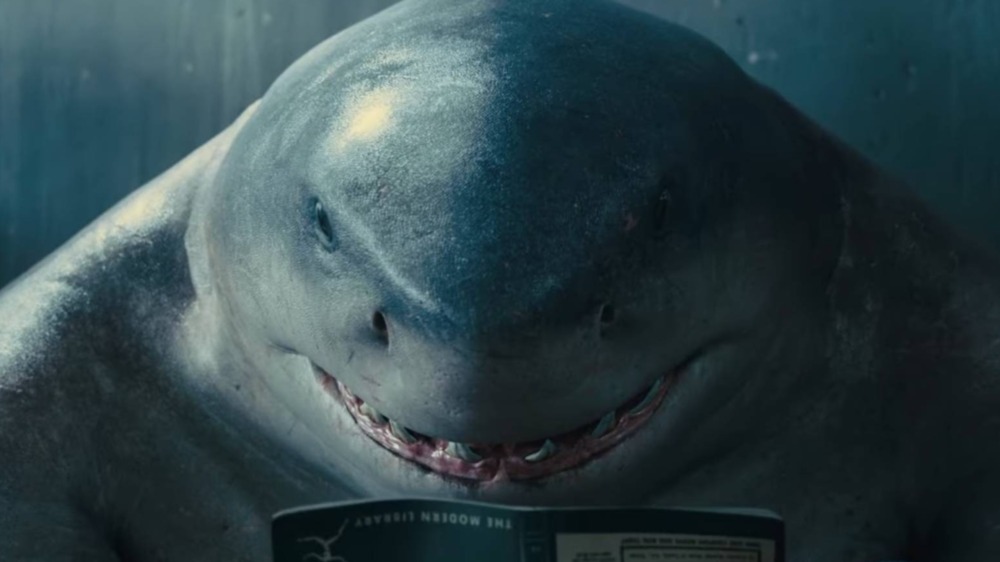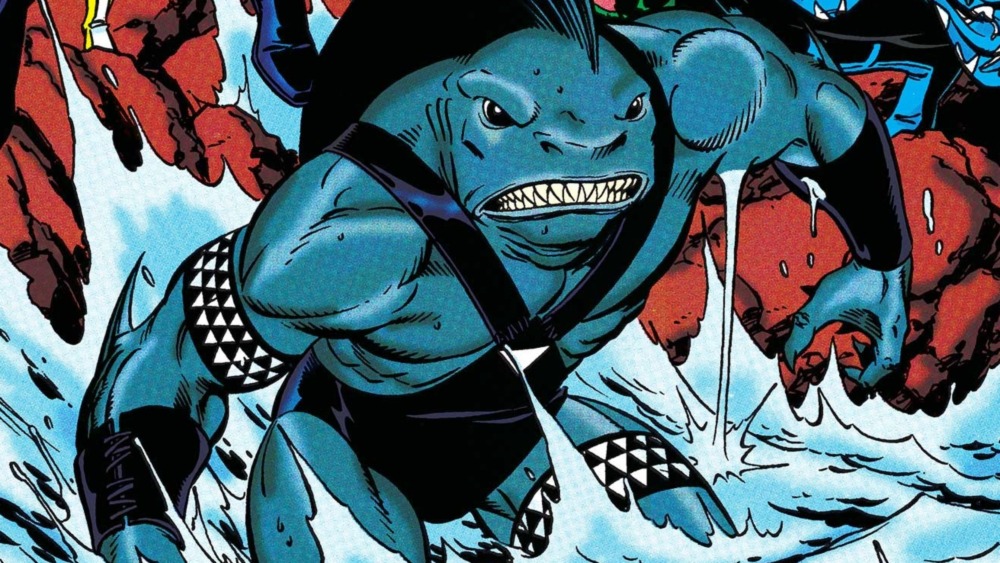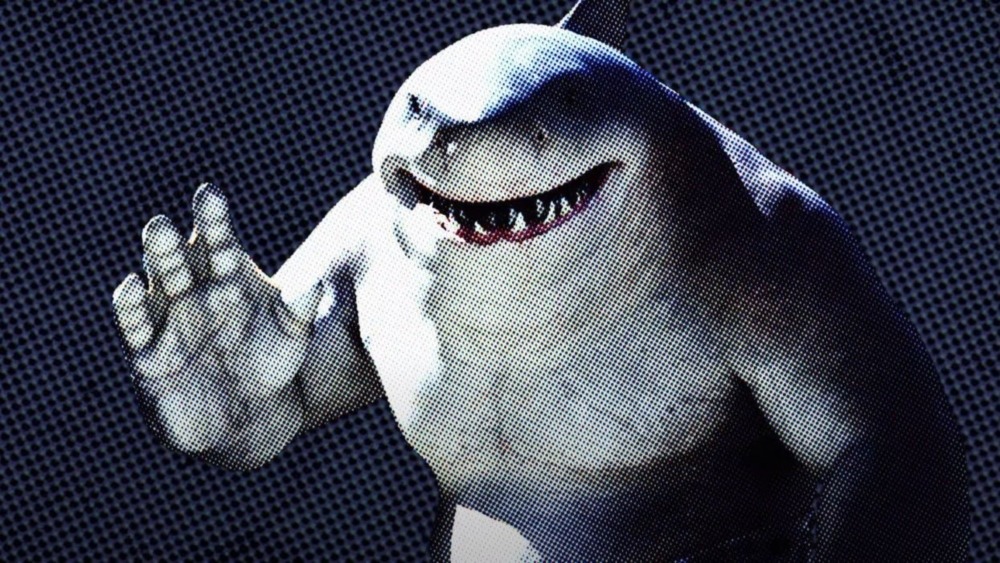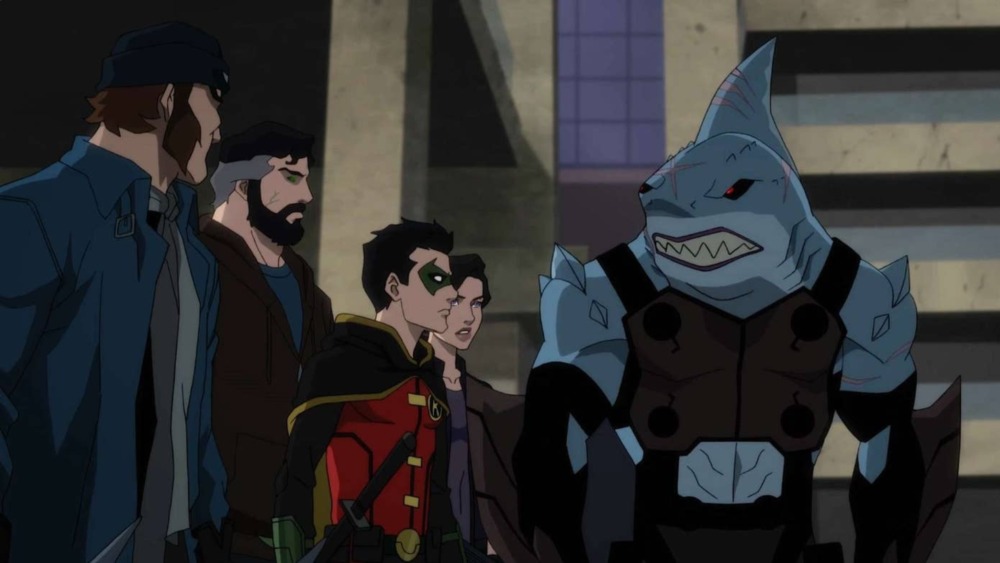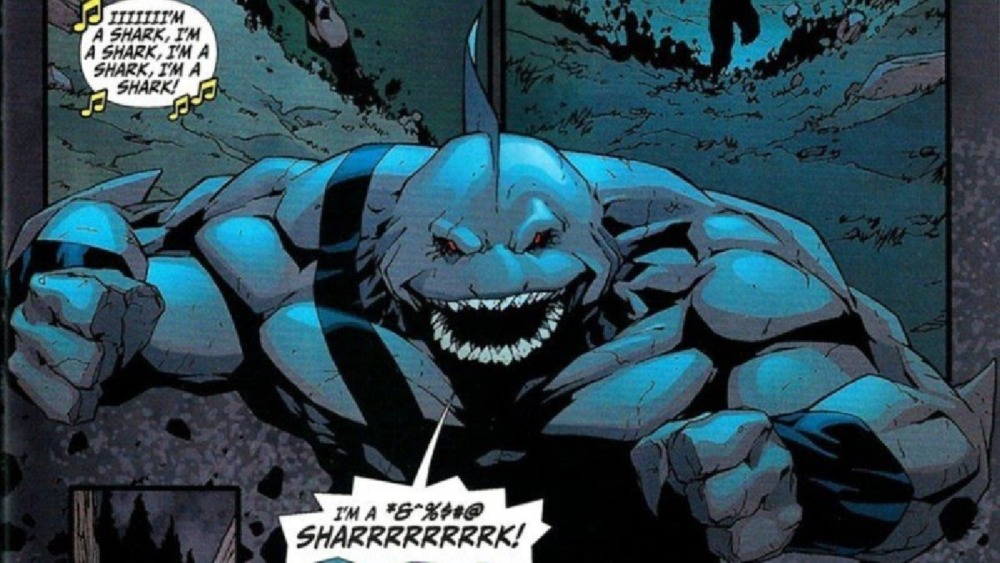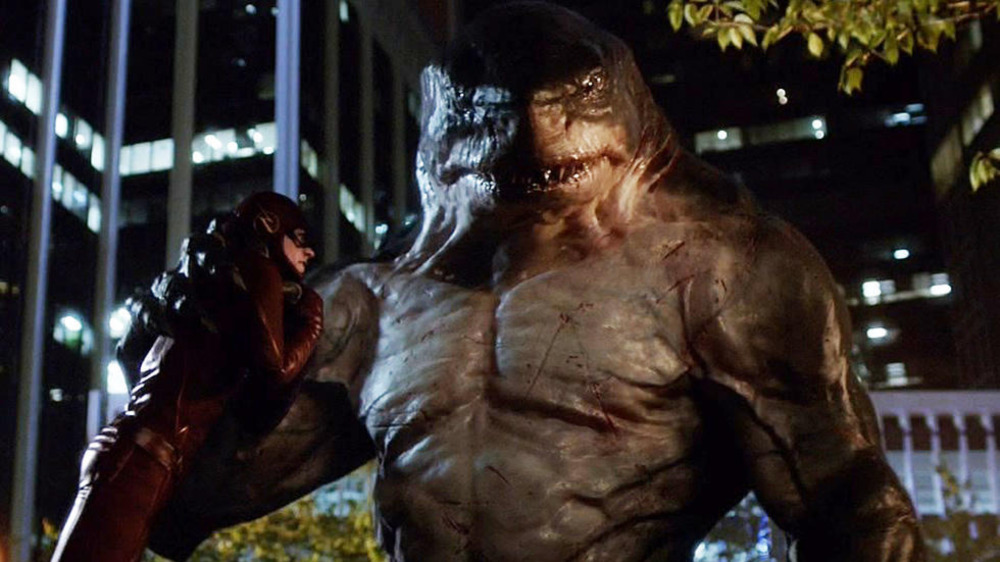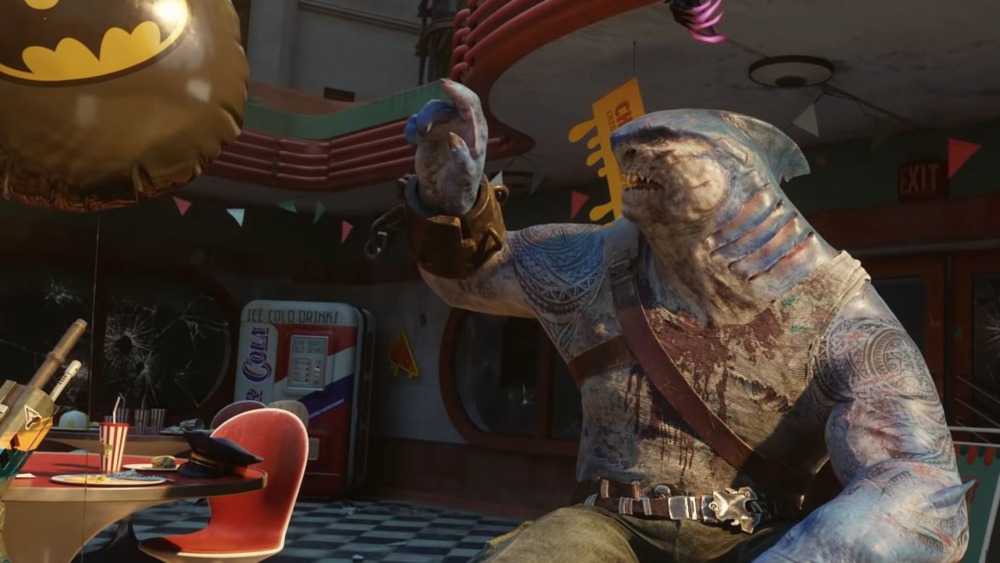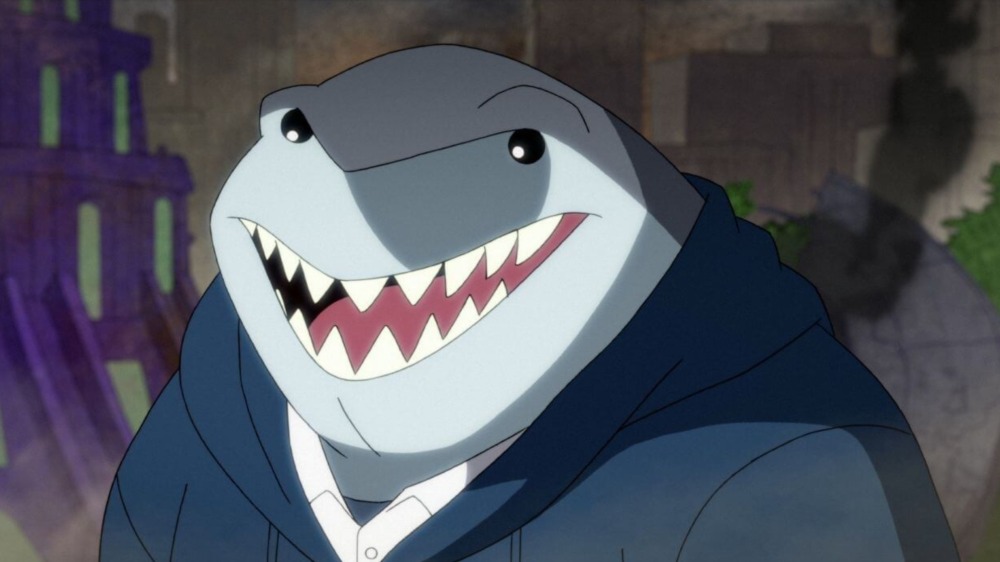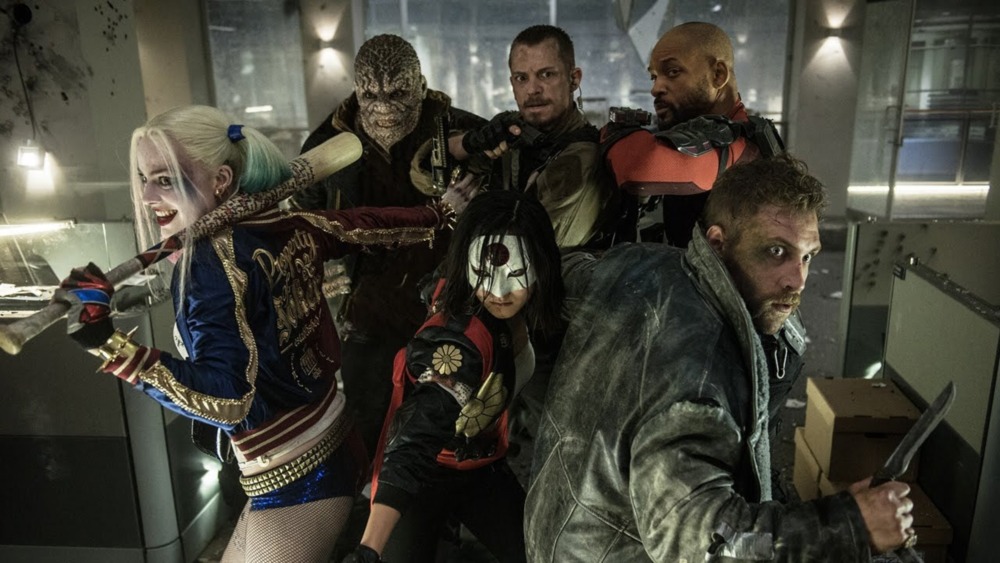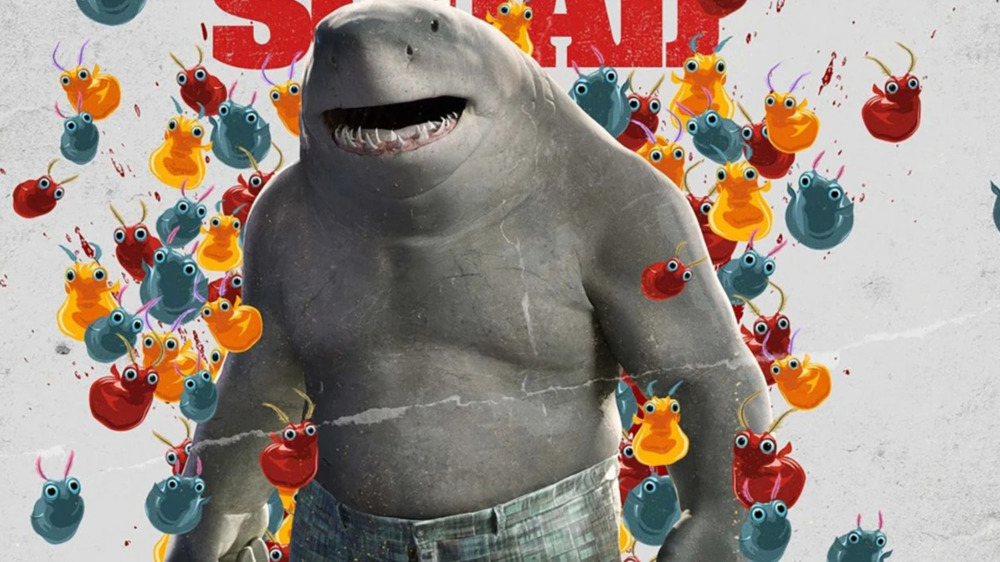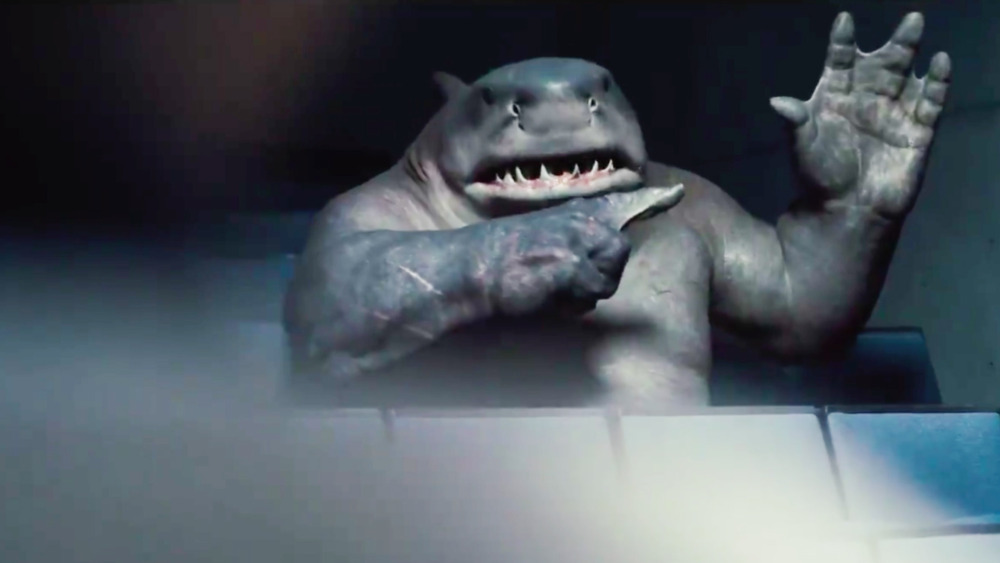The Untold Truth Of DC's King Shark
For many iconic comic book figures, it can take decades to truly find audience appreciation, for enough of a fandom to develop to solidify their presence as an indisputable part of a comic book universe. And then there are the comic book figures who manage to build up popularity quite quickly. Such is the case for one particularly fishy star of the upcoming blockbuster feature The Suicide Squad. Despite having existed only since the mid-1990s, DC Comics baddie King Shark has already taken on a large amount of popularity, to the point that his pronounced presence in the first substantial trailer for The Suicide Squad was the talk of the internet. The appeal of the character is quite apparent; he's a gigantic shark who can gobble up people but also has a soft side and an interest in literature. That kind of juxtaposition is irresistible!
Though the surface-level charms of the character have helped to catapult him to such extreme popularity, there are also many untold elements of King Shark that have helped to explain how this villain has managed to become such a ubiquitous part of pop culture despite having existed for a (comparatively) short period of time. Whether it's in the unexpected comic books where he first appeared or in the different types of media he's shown up in over the years, all these untold qualities help shed further light on everyone's favorite comic book shark.
King Shark was first introduced in a Superboy comic
You might expect that King Shark would have started out life as an Aquaman villain. While he would face off with that underwater superhero in later issues, King Shark did not begin his time in the DC Universe as an Aquaman foe. In reality, King Shark kicked off his comic book existence as an adversary of Superboy. In the 1994 comic Superboy (Volume 4) Issue #0, King Shark is introduced in the shadows under the name of Nanaue. He subsequently causes trouble in the series' ninth issue, in which he's broken out of prison, has a grisly reunion with his mother, and attempts to gobble up surfers at the beach — an act foiled by Superboy.
This cemented the rivalry between this original version of King Shark and Superboy. They would continue to face off across the issues that followed, including in one storyline that sees the aquatic tough guy squaring off against the superhero as a member of a group King Shark would become frequently associated with, the Suicide Squad.
In the years that followed his mid-'90s debut, King Shark has gone on to battle a wide array of DC Comics mainstays, including Aquaman. He's also become a member of the central ensemble in many solo Suicide Squad storylines. However, his earliest stories are confined to Superboy comics, in which he established himself firmly as a comic book baddie with teeth.
What exactly is King Shark?
Some comic book characters, like Spider-Man, have a concrete origin that hasn't been drastically altered over the course of multiple decades. Others take a little more time to have their origins filled out. This is true of King Shark, who was initially presumed by onlookers in his earliest Superboy appearances to be either a human being who had turned into a shark-like creature or a highly-evolved form of a shark. This carried over into subsequent King Shark appearances, but it wouldn't stay as a permanent fixture of his makeup.
Future comic book storylines would solidify that King Shark was neither mutant nor amped-up shark. In Aquaman: Sword of Atlantis #40, a concrete backstory for King Shark is revealed that establishes him as the son of a Shark God. In fact, the wishes of his father are what put King Shark into direct conflict with Aquaman in this story. This didn't just clear up where this supervillain came from — it also provided humor in subsequent adventures juxtaposing King Shark's status of royalty with how he was often just another murderous crook in his eventual de facto home, the Suicide Squad. It may have taken him a while to get a solid backstory, but King Shark eventually got just that, and it's quite a powerful one. His royal ancestry has gone on to inform his various media appearances, including being the inspiration for his backstory on the TV show Harley Quinn.
King Shark has had a fluid capacity for speech
Sharks don't talk. This simple fact is one ignored by King Shark, who usually displays some level of speech. However, the various comic and media incarnations of King Shark have given him varying degrees of eloquence over the years. In the early Superboy comics, he doesn't talk at all. Subsequent comic book appearances had King Shark be capable enough of talking that he could make pointed comments and grim jokes. But later on, he was again reduced King Shark to a more feral creature with a limited ability to speak. Sometimes, King Shark has been a creature more capable of ripping people to shreds than delivering complex dialogue.
Modern pieces of media have taken a similarly fluid approach to King Shark's speech patterns. Some recent comics depict King Shark as being dense enough that he can only refer to himself in the third-person. Other incarnations of the character, like the Ron Funches-voiced take seen on the Harley Quinn animated series, show King Shark carrying the same speech capacities as your average human being and even being more emotionally sensitive than many of the humans around him. The flexibility of this quality of King Shark was certainly a total accident, but it's had its advantages. Most notably, it's allowed a greater degree of freedom for individual storytellers to put their stamp on the character.
King Shark gets fleshed out in Gail Simone's Secret Six arc
The Secret Six were predominately a D-list group in the DC Comics pantheon until acclaimed writer Gail Simone breathed new life into them with her 2006 iteration of the team. This group's ever-shifting roster eventually included none other than King Shark. This was a result of Simone's complex creative process for bringing her version of the Secret Six to life. Once her original plan to utilize A-list DC Comics supervillains fell through, Simone shifted over to an alternative method. "It started as a joke. We should just pick the crappiest villains that no one in their right mind would want," Simone explained. "So I picked a bunch of losers too low to even be on the Suicide Squad."
Among the lesser-known figures she'd turn to would be King Shark. Though not initially on the Secret Six team, it wasn't long before King Shark would become a prominent part of the group, appearing in 15 separate issues of Secret Six. Simone's take on the character was memorable, doing things like dashing down a hill while singing "I'm a shark!" to the tune of "The Map Song" from Dora the Explorer. As Simone herself noted on Twitter, this more loveable take on King Shark has been a massive inspiration to subsequent versions of the character. There were many memorable storylines and characters in Simone's take on the Secret Six, but her incarnation of King Shark has proven especially impactful.
King Shark becomes a TV star with The Flash
When you're on a CW TV show, you have to be aware that your storytelling opportunities might be limited by budgetary restrictions. Even the best major broadcast TV shows are typically made on shoestring budgets and, for a superhero series, that automatically rules out a number of villains that would require expensive visual effects wizardry to be brought to life properly. That hasn't stopped The Flash from delivering some grandiose (and expensive-looking) foes over its run on the air, which have included the unexpected appearance of King Shark.
Brought to life through computer-generated imagery, King Shark was an unexpected presence for a major broadcast network program, but there he was in the final moments of a season 2 episode. From there, the genie was out of the bottle and there was no way King Shark wasn't going to have further adventures on the show, budgetary restrictions or not. The character would go on to have a recurring presence on The Flash that has extended well beyond mere end-of-the-episode cameos. King Shark has become enough of a staple of the show to have episodes largely revolving around his own storylines, like the season 5 episode "King Shark vs. Gorilla Grodd." Though King Shark hasn't been much of a notable Flash adversary in the comics, he, even in the face of those nefarious budgetary restrictions, turned out to be a fan-favorite baddie for The CW's take on the speedy superhero.
King Shark enters the world of video games
In recent years, King Shark's increased popularity has led to the character popping up in a number of DC video games. His presence in this domain began with an appearance in DC Universe Online before making a pair of appearances in the more family-friendly creations LEGO Batman 3: Beyond Gotham and LEGO DC Super-Villains. In all of these instances, King Shark's presence was less of a reflection on how popular the character himself was and more of an attempt to make sure all three titles had as comprehensive a library of DC Comics characters as possible.
King Shark's most prominent video game appearance has yet to arrive, though. The upcoming game Suicide Squad: Kill the Justice League will finally feature the character in a capacity beyond just making sure a game has a surplus of DC Comics fixtures. King Shark will serve as one of the game's four leads alongside mainstays from the comic book version of the Suicide Squad, including Harley Quinn, Captain Boomerang, and Deadshot. Voiced by Samoa Joe, the trailer for this game establishes King Shark as a more considerate soul with an extensive vocabulary, as well as the gift of chomping down enemies in one gulp. Kill the Justice League certainly has the potential to provide another memorable video game appearance for King Shark.
The various animated incarnations of King Shark
In recent years, King Shark has become a prominent fixture of animated DC Comics properties. While his presence in DC Super Hero Girls (voiced by Kevin Michael Richardson) showed that the character can work in animated confines aimed at youngsters, King Shark has had a particularly notable animated presence on programs aimed at adults. For instance, in the extremely violent animated direct-to-video movie Batman: Assault on Arkham, King Shark appears voiced by John DiMaggio, who would reprise the role in Justice League Dark: Apokolips War. Though these versions of King Shark share a voice actor, they're quite different in personality, with the version appearing in Apokolips War having his dialogue largely limited to repeated utterances of "King Shark is a shark!"
The most popular animated incarnation of King Shark emerged on the animated series Harley Quinn. Here voiced by Ron Funches, this version of King Shark reimagines the underwater adversary as a relaxed tech-savvy everyman. First introduced in the show to help Harley Quinn with an online profile meant to attract potential foes, King Shark ends up becoming a prominent part of Harley's team. This version of the character became so popular that even The Suicide Squad director James Gunn noted that "I love [King Shark's] design & the Harley Quinn show & @RonFunches version" when talking about the design choices for his own take on King Shark.
King Shark almost made it into the first Suicide Squad movie
The 2016 Suicide Squad movie featured plenty of distinctive figures from the DC Comics mythos. A man-sized crocodile who ate people, a lady who traps the souls of her victims in her sword, and of course, Slipknot, the man who can climb anything. However, the cast of Suicide Squad would have been even more peculiar with its original line-up, which included King Shark.
Suicide Squad writer-director David Ayer himself revealed this factoid in a Twitter video when a fan asked if there were any comic book characters he wanted to include in the film but couldn't. King Shark turned out to be one of those figures, which isn't a surprising development given that King Shark has regularly been a fixture of the comic book incarnation of the team over the years. Why didn't the character make it in? "We realized it would take a lot of work, a lot of CG Work," Ayer explained. "I wasn't comfortable going with a fully CG character." Wishing to keep the film as practically-realized as possible, King Shark was left behind for the Suicide Squad's first trip to the silver screen. Ayer also revealed that the exclusion of King Shark allowed for the inclusion of Killer Croc, who was realized through makeup effects rather than the CG necessary to bring King Shark to life.
Steve Agee portrayed King Shark on the set of The Suicide Squad
In James Gunn's comic book movies, it's not unusual to have CG characters represented on set by one actor before another performer tackles voicing the character in post-production. It's a method Gunn utilized for the roles of Rocket Raccoon and Groot in his two Guardians of the Galaxy movies, with the former character being portrayed on-set by Sean Gunn before getting voiced by Bradley Cooper in post-production. This is a mode of casting that Gunn returned to once again for the character of King Shark in The Suicide Squad.
For this underwater nemesis, Gunn had the character represented on-set by Steve Agee. Beginning with his role in the 2011 film Super, Agee has become a recurring fixture of Gunn projects, including Guardians of the Galaxy Vol. 2 and the Gunn-produced superhero horror movie Brightburn. Their collaborations have gone to the next level with Agee's on-set work as King Shark. It was made clear early on that Agee wouldn't be providing the voice for the character, since he was only credited as "On-Set Actor" in DC Fandome 2020 materials for The Suicide Squad.
Though he was replaced by another actor when it came time for King Shark's voicework, Agee still found an on-screen role in The Suicide Squad in the form of Amanda Waller's right-hand man, John Economos.
How Sylvester Stallone took a bite out of the role of King Shark
In November 2020, the internet flew into a flurry of speculation when James Gunn announced that he would be reuniting with his Guardians of the Galaxy Vol. 2 cast member Sylvester Stallone for a voice-over role in The Suicide Squad. Intense speculation ensued, but it wouldn't be long before the internet got to discover who Rocky Balboa would be playing in the DC Universe. The day the first The Suicide Squad trailer dropped, it was confirmed that Stallone would be lending his pipes to the character of King Shark.
The news came on the heels of speculation not only over who Stallone would be playing, but also who would be voicing King Shark, with Michael Rooker being a notable name previously rumored to provide the character's voicework (Rooker is actually playing the live-action role of Savant). All that speculation was for naught, as Gunn apparently had long imagined Stallone inhabiting the fishy role. In the wake of the announcement, Gunn revealed on Twitter that he wrote King Shark specifically for Stallone. Turns out, there was nobody more perfect for the role of King Shark than an icon of 1980s cinema.
